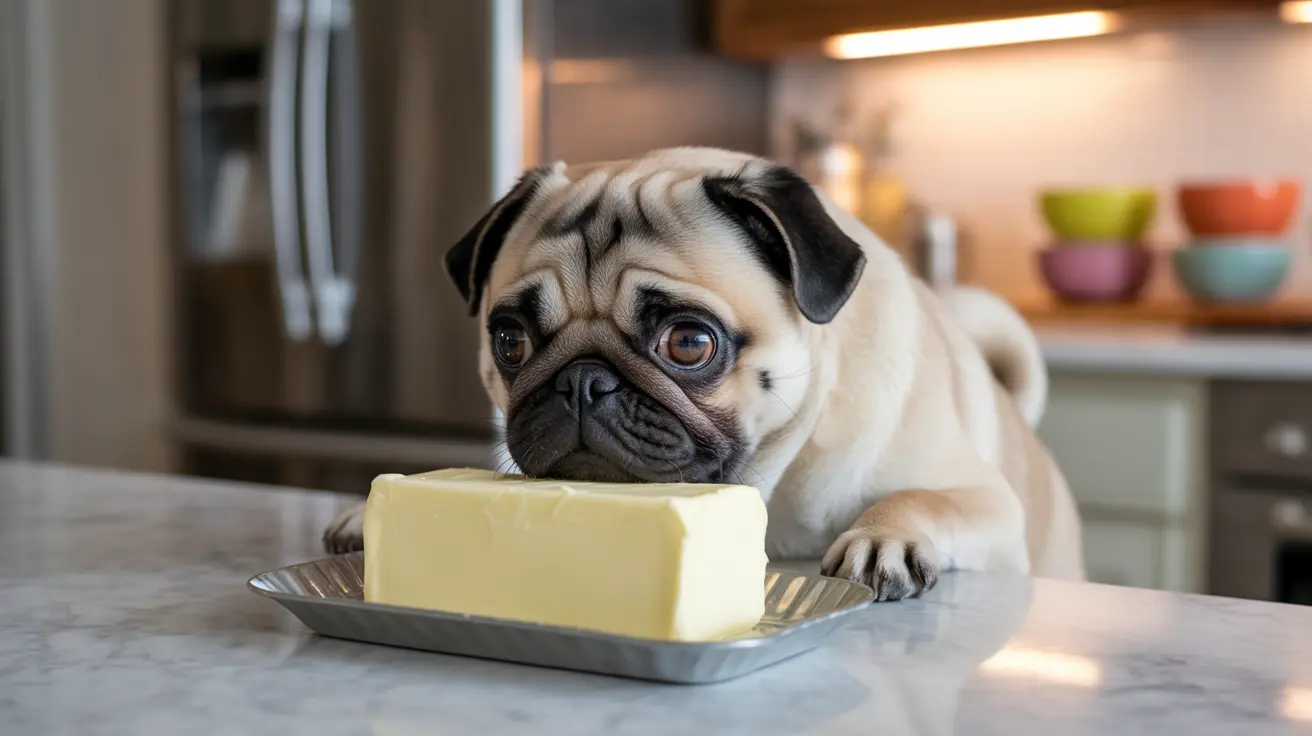If you've ever caught your dog eyeing that stick of butter on your kitchen counter, you might be wondering about its safety. While butter isn't toxic to dogs, it's not a food that should be intentionally included in their diet. Understanding the risks and implications of butter consumption can help you make informed decisions about your pet's nutrition.
Let's explore everything you need to know about dogs and butter, including potential health risks, what to do if your dog consumes butter, and safer alternatives for treats.
Understanding Butter's Impact on Dogs
Butter consists primarily of saturated fat and contains approximately 100 calories per tablespoon. For a medium-sized dog weighing 40 pounds, that single tablespoon represents about 25% of their daily caloric needs - far more than any treat should provide.
While butter contains small amounts of vitamins A and D, these quantities are insufficient to provide any meaningful nutritional benefits for your dog. Instead, the high fat content poses several health risks.
Health Risks Associated with Butter Consumption
Immediate Concerns
When dogs consume butter, they may experience several immediate issues:
- Digestive upset and diarrhea
- Vomiting
- Abdominal discomfort
- Gas and bloating
- Lethargy
Long-term Health Implications
Regular butter consumption can lead to more serious health conditions:
- Obesity and weight management issues
- Pancreatitis (inflammation of the pancreas)
- Cardiovascular problems
- Joint stress from excess weight
- Decreased overall health and vitality
What Happens When Dogs Eat Butter?
The severity of symptoms depends largely on the amount consumed and your dog's individual sensitivity to dairy products. Many dogs are lactose intolerant, which can intensify their reaction to butter.
Small amounts might cause mild digestive upset, while larger quantities could trigger more serious conditions like pancreatitis, which requires immediate veterinary attention.
Managing Accidental Butter Consumption
If your dog has eaten butter, follow these steps:
- Determine the amount consumed
- Monitor for symptoms of digestive upset
- Ensure fresh water is available
- Contact your veterinarian if symptoms are severe or persist
- Watch for signs of pancreatitis, including severe abdominal pain and repeated vomiting
Preventing Future Incidents
To protect your dog from accessing butter:
- Store butter in sealed containers or the refrigerator
- Keep butter out of reach during cooking
- Clean up spills immediately
- Train your dog to avoid counter-surfing
- Inform family members about the risks of feeding butter to dogs
Healthy Alternatives to Butter
Instead of butter, consider these dog-safe treats:
- Fresh vegetables like carrots or green beans
- Small pieces of lean, cooked meat
- Commercial dog treats formulated for canine nutrition
- Plain, low-fat yogurt (in moderation)
- Fresh fruits like apple slices (without seeds)
Frequently Asked Questions
Is it safe for my dog to eat butter occasionally or in small amounts?
While small amounts of butter aren't toxic, it's best to avoid feeding it to your dog intentionally. The high fat content offers no nutritional benefits and can lead to health problems.
What health problems can butter consumption cause in dogs?
Butter can cause immediate issues like digestive upset and diarrhea, as well as more serious conditions like pancreatitis, obesity, and cardiovascular problems.
How can I tell if my dog is experiencing digestive issues from eating butter?
Watch for symptoms such as vomiting, diarrhea, lethargy, abdominal pain, or loss of appetite. These signs typically appear within a few hours of consumption.
What should I do if my dog eats a large amount of butter?
Contact your veterinarian immediately, especially if your dog shows signs of distress. Monitor for symptoms and provide plenty of fresh water.
What are healthier alternatives to butter I can give my dog as treats?
Opt for dog-specific treats or healthy alternatives like small pieces of lean meat, fresh vegetables, or commercial dog treats formulated for proper canine nutrition.
Remember, while butter isn't toxic to dogs, it's best to keep it out of their reach and stick to treats specifically designed for canine consumption. Your dog's health and well-being depend on making informed choices about their diet.






